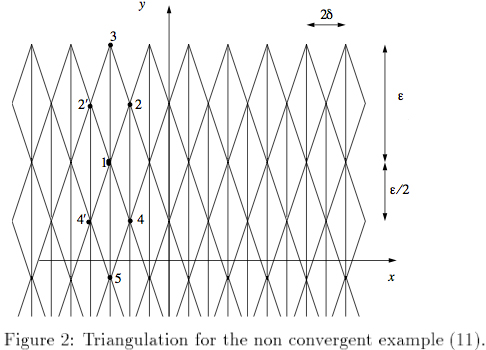This may not be what you seek, but in the 1996 paper,
"Anisotropic refinement algorithms for finite elements"
by Goodman, Samuelsson, and Szepessy (.ps link), they
show an example of a function $u(x,y)=\frac{1}{2} y^2$, independent of $x$,
which solves $\Delta u = 1$ on $\mathbb{R}^2$.
But with the triangulation shown below, with $\delta \ll \epsilon$, as $\delta \rightarrow 0$,
the finite element equation approximates $\Delta u = 0$ instead of $\Delta u = 1$.
Nonconvergence http://cs.smith.edu/%7Eorourke/MathOverflow/Nonconvergence.jpg
